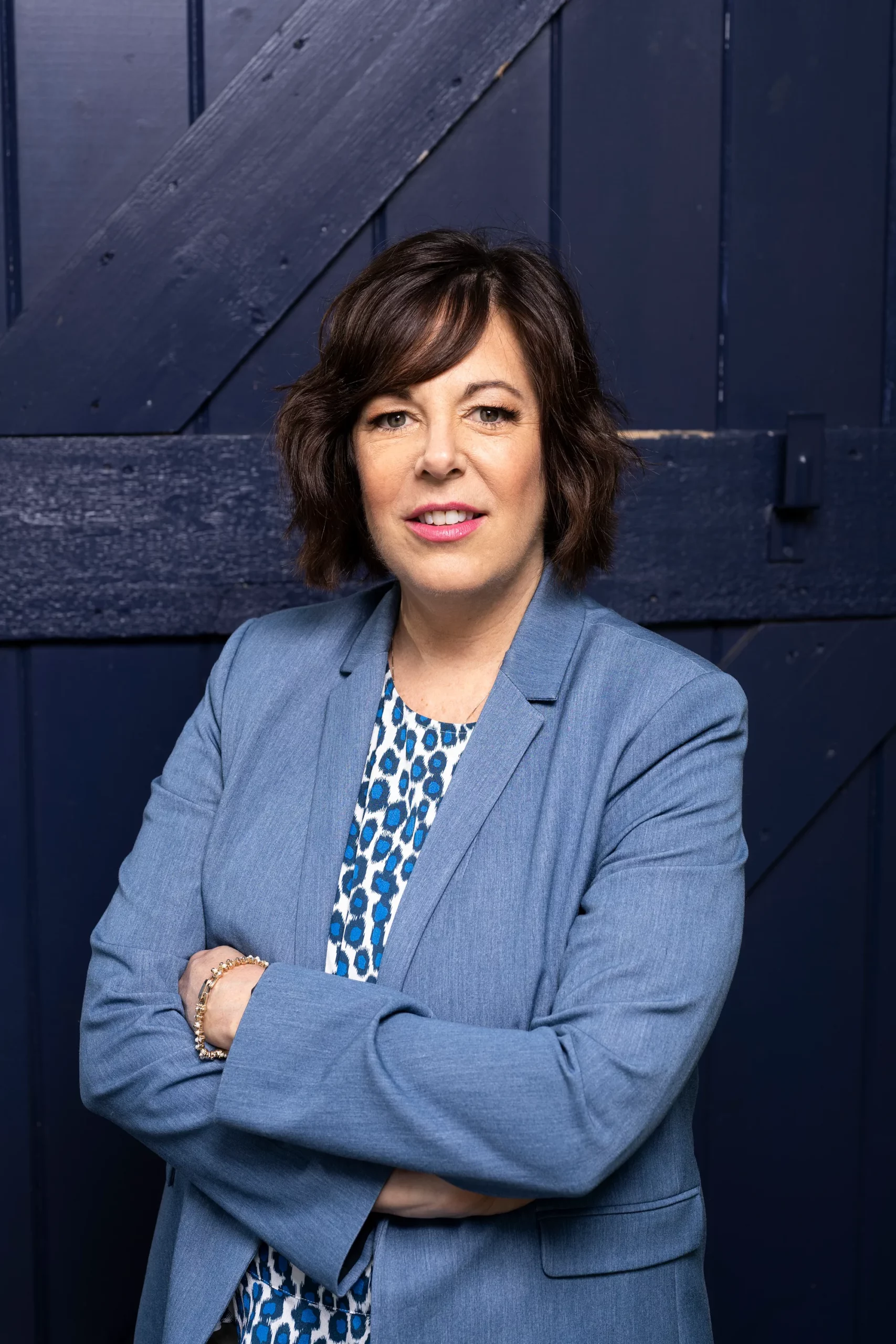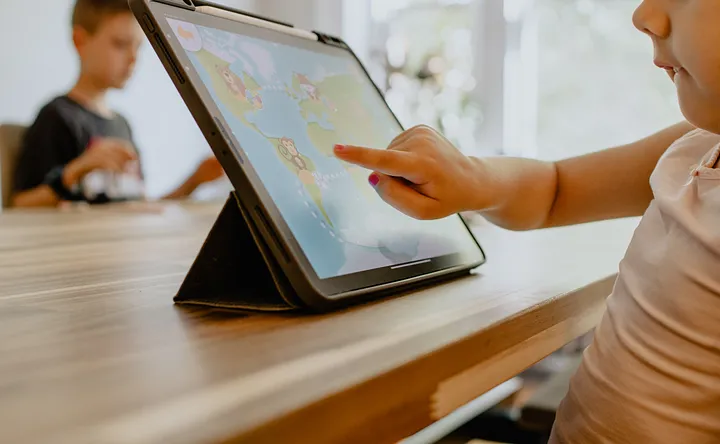Stop bullshitting yourself.” This is a recent learning and comes from the book Reboot by Jerry Colonna. It changed my entire view on the struggles I faced. The theory being that we are all complicit in how our life unfolds. We’ve all played a part in what comes to pass. When struggles arise, we are so quick to blame, play the victim, and abdicate our part in why we are where we are. In the book he says “stop bullshitting yourself” in the context of asking “what part did I contribute to get to this outcome?” To stop and really look at my own actions and words that played a part here. Not so I can shoulder the blame completely but understand and own my contribution to the current situation.
Asa part of our series about women who are shaking things up in their industry, we had the pleasure of interviewing Carleen Haylett.
Carleen Haylett is the CEO and Founder of EnrichedHQ, a marketplace changing the way families engage school-age kids. Through live virtual activities, EnrichedHQ is bringing together activity providers and content with families who need flexible childcare options. In this episode Carleen discusses how her company is working with corporate clients to provide access to working families as an extension of traditional childcare options.
LinkedIn: https://www.linkedin.com/in/carleen-haylett-18a5521/
Company website: https://enrichedhq.com
Thank you so much for doing this with us! Before we dig in, our readers would like to get to know you a bit more. Can you tell us a bit about your “backstory”? What led you to this particular career path?
Mystory is absolutely an “I’m solving my own problem” situation. I have been working in enterprise technology my entire career starting in development and moving through product management, operations, and ultimately sales. 11 years ago, I had a son. As a single mother and working professional without a local family network I faced the daunting task of piecing together a crazy labyrinth of care for my son so I could work, travel to clients, and support him. It has been ridiculously stressful, extremely expensive, and a constant stressor. In early 2020 I came to the “ENOUGH!” moment.
My problem, like for so many working families, was having easy access to programs that provided my son learning opportunities that weren’t being addressed in traditional schools. It would take forever down Internet ratholes to find the right vendor, compare costs and schedules, and manage each relationship individually. As a technologist I knew this problem could be solved. That’s when EnrichedHQ was born.
Shortly after the company started the wheels fell off the world with COVID-19 and the programs we were offering became highly urgent for families. This tailwind fueled our initial growth and despite life somewhat returning to normal has continued. Parents see value in the programs available on our platform because we focus on life-skills-building activities for school-aged kids. These are thing kids should be learning to better prepare them for “real life” but aren’t getting.
Ultimately, I’m on this path because I had a problem, I was no longer willing to deal with. I now know I was never alone in this struggle. This is a major issue not only for parents but impacts corporations who are our clients because families are choosing other options for their kids and choosing employers who better support families. We fill that gap and as a bonus, I’ve solved my own problem.
Can you tell our readers what it is about the work you’re doing that’s disruptive?
EnrichedHQ is doing its part to usher in new and creative ways that kids get educated. Whether because of the pandemic and school closures or not, we’ve collectively embraced that the way we educate kids today is failing them. The notion of being locked up in a classroom all day, lectured to for the sole purpose of regurgitating memorized materials and achieving arbitrary grades isn’t doing anything to prepare kids for “real life.”
So much needs to change and one thing we did learn from pandemic lockdown is “hey, guess what, virtual learning DOES work for a ton of things.” On top of that, virtual learning gives kids access to topics and programs previously limited by their school’s offering (based on budgets and testing) and geography. Live, virtual programing gives a wider range of students in a wider range of geographic regions affordable access to things they might never have experienced.
For our clients (like Adobe, AMEX, Genpact and more) as well as individual families we’re helping families better balance work life and home life. Especially for working moms who, like me, are feeling forced to choose between supporting their kids and having a job. This is simply urgent. Families shouldn’t need to shoulder the cost of extracurricular activities for the right to have a job. We help companies better support workers with our turnkey solution.
Can you share a story about the funniest mistake you made when you were first starting? Can you tell us what lesson you learned from that?
There were sooooo many mistakes. I’m not sure I’d call any of them “funny.” More like painful learning experiences.
I suppose the funniest was really my own naiveté. I knew the problem I was solving needing a solution so I believed we’d be an overnight success. Even though I knew every parent in my circle struggled with the same problem, I believed investors would flock to me, fund my company with large sums so we would quickly grow and support huge populations of families and kids.
Well, after hundreds (and hundreds) of investor pitches and 3 years of blood sweat and tears I had forgotten what I knew to be true from my enterprise sales days. Revenue fixes everything. I was convinced this was such a no brainer that this golden rule didn’t apply to EHQ. Boy was I wrong.
We all need a little help along the journey. Who have been some of your mentors? Can you share a story about how they made an impact?
I have been so blessed with advisors who have believed in my vision from the start. Early on an executive I had worked with was with me every single step of the way. He was (and still is) a huge source of sage advice. If I had to pick one impact it would be him simply allowing for a non-judgmental space to share anything. Ideas, fears, self-doubt, whatever, he was always there.
There’s not one story or event that stands out vs. others but he would spend hours with me going over our market strategy, financial models, rewriting grant proposals, sales pitches, you name it.
But in the end the one thing he continually did was provide encouragement. Every time I doubted, he was quick to list off several major things I’d accomplished, or how far I’d come. I’ve been truly blessed by his belief in EHQ and me.
Being a founder is a lonely, stressful life. Being lucky enough to have people around you who truly believe and continue to remind you to celebrate the wins, no matter how small, is invaluable.
In today’s parlance, being disruptive is usually a positive adjective. But is disrupting always good? When do we say the converse, that a system or structure has ‘withstood the test of time’? Can you articulate to our readers when disrupting an industry is positive, and when disrupting an industry is ‘not so positive’? Can you share some examples of what you mean?
Surely the education space today is in dire need of disruption. It’s happening slowly but gaining speed and attracting much attention from lawmakers and the investment community.
There is a large recognition that traditional education is failing kids by not providing them opportunities to gain real-life skills. In addition, cookie-cutter delivery is horrible in addressing individual needs of kids. The most impactful example for me is my own son during COVID lock down. Previously he was in traditional school and often complained of being bored, unchallenged and just generally disinterested.
What I witnessed during lockdown was truly incredible. First, we started with homeschooling, and I purposely involved him in building a program of things he was interested in and selecting tools in core topics (like math, English, etc) that he chose. Then I enrolled him in a virtual school that was focused on problem solving programs. He’d work with other kids in teams to solve problems or complete activities. The outcome was truly amazing. He absolutely thrived in this type of learning environment.
The biggest Ah-ha moment for me was witnessing how improved things like his math skills accelerated so quickly because he was focusing on learning to code. The second was his ability to take ownership of his learning. The lesson is that all kids thrive in different environments and our current educational structure does not provide that. Kids that learn differently, require or desire more focus in one area or another, aren’t offered the individual attention they need or deserve. To deliver this, the way we think of “school” and “curriculum” needs modernization and needs to incorporate key items that provide life-skills programs so kids are ready to thrive post high school, whatever their chosen path might be.
As for a not so positive example of disruption, I can’t honestly think of one. Not that every industry is in dire need of disruption but that I generally feel disruption is a good thing. The more we can support innovation the better. New technologies are coming of age so rapidly that for any one industry to ignore the capabilities of these new ways of operating would be a pity. There’s always room for improvement.
Can you share 3 of the best words of advice you’ve gotten along your journey? Please give a story or example for each.
“Get ‘er dun.” In explaining to an executive (he was like an old cowboy which is why it’s written this way) what I was planning to do with/for a client he used to say “get ‘er dun.” What he was conveying was, “why are you standing here telling me about it? Why will you be doing this in the future and not right now? Go Carleen, get ‘er dun.”
From the same executive, “why are you discussing this with someone who can’t solve your problem?” I use this all the time, in every situation, professional or not. Point being, make sure you know the person you’re dealing with has the power to fix whatever you need fixing. Whether it’s signing a contract, fixing your Wi-Fi bill, or any of life’s other challenges. Unless you’re dealing with the person who can solve your problem, you’re wasting your time and theirs.
“Stop bullshitting yourself.” This is a recent learning and comes from the book Reboot by Jerry Colonna. It changed my entire view on the struggles I faced. The theory being that we are all complicit in how our life unfolds. We’ve all played a part in what comes to pass. When struggles arise, we are so quick to blame, play the victim, and abdicate our part in why we are where we are. In the book he says “stop bullshitting yourself” in the context of asking “what part did I contribute to get to this outcome?” To stop and really look at my own actions and words that played a part here. Not so I can shoulder the blame completely but understand and own my contribution to the current situation.
We are sure you aren’t done. How are you going to shake things up next?
Well, I’m not done here yet so I’m continuing to bring the EHQ Marketplace and our incredible Activity Partner offerings to as many companies as we can as quickly as we can. I view this as the shortest distance between us and getting kids the programming they need to thrive beyond school.
We’ve also started expanding this mission to support families in underprivileged communities. Our mission is to help kids and families, especially in areas that have little access to these types of offerings. Whether it be due to location, lack of school funding, lack of availability and affordability, we believe no child should be excluded from having a fair, fighting chance to make their way in the world. Currently we’re working on partnerships with several national organizations serving these communities. Our goal is supporting these organizations by providing the communities they serve with access to EHQ to all families.
In your opinion, what are the biggest challenges faced by ‘women disruptors’ that aren’t typically faced by their male counterparts?
That’s a hard one to pinpoint because there are so many. Women are severely under funded from the investment community. In 2022 only 2% of all VC funds went to women founded companies. That’s a problem not only because of the inequality of it but lots of studies show data indicating women-founded companies consistently outperform male-led companies over time.
Yet the “biggest” I feel is the explicit or even non-overt bias against women as leaders. I’ve experienced this my entire career. And the range of bias is so broad. You’re either to be relegated to the side because the belief is you should be home caring for the kids or that women are too emotional to be executives so they are passed over for promotions, and anything in-between.
I don’t have an answer. Like most women I’m angry and frustrated but also feel no empowerment to make changes. And it’s not just men holding these biases. I’ve experienced this same treatment from other women. Until we can all look in the mirror and be the type of leader who raises up all who deserve it regardless of race, gender or identity we will continue struggling. I’m hopeful for the future though.
Do you have a book/podcast/talk that’s had a deep impact on your thinking? Can you share a story with us?
So many good ones both personally and professionally. From a leadership perspective I go back to Jerry Colona’s Reboot. Simply because it’s like a slap in the face. It really forces you to look at your role in any situation and take ownership.
For sales negotiation specifically, Don’t Split the Difference by Chris Voss is probably the best book I’ve read on negotiations (and I’ve read a ton of them). It really turns your view of how to run a successful negotiation on its ear. The best part is the tactics work beautifully on kids too.
The Alchemist by Paulo Coelho is at the top of my life improvement books. I reread it once or twice a year for the simplicity of the message. Everything you need is where you are at that moment. Recognizing this and being grateful for all the gifts you have, big or small, in every moment is what makes for a rich life.
You are a person of great influence. If you could inspire a movement that would bring the most amount of good to the most amount of people, what would that be? You never know what your idea can trigger. 🙂
It would definitely be in the space I’m in now but while I’m solving a narrow part of the problem I’m thinking more broadly about kids. ALL kids deserve an opportunity to thrive and live their best lives possible. This is no truer than in underprivileged communities where access and affordability of learning programs are in limited supply. I feel we collectively need to look at solving this issue of the haves and have nots when it comes to kids and education. Technical innovation can play a huge part but it extends far beyond that. Things like how we get this into the communities, how we enable parents to easily access these tools to support their kids, how do we make them affordable. It’s such a massive problem but if we keep pushing, we will and can fix it. Just like I tell my son “there’s a solution to every problem,” this is no different.
Can you please give us your favorite “Life Lesson Quote”? Can you share how that was relevant to you in your life?
“It’s not always about you, Carleen.”
This was said to me by a boss and mentor years ago. I was frustrated a client wasn’t getting back to me on a large proposal. It has always stuck as an extremely important thing to remember when I’m reacting to anything. I ask myself “what evidence is there to prove your assumption is right?”
I love it because it applies to everything, not just professionally. Since the pandemic and my son started homeschooling it has proven an exceptional tool to force myself to pause before reacting emotionally. Better still it helps me to remember to seek knowledge and truths before making assumptions.
So much time is wasted in our heads, making up stories, ruminating, and working ourselves up in a tizzy. I’ve found if I just ask myself that simple question and recognize another’s actions are rarely about me, I realize most of what I made assumptions about simply didn’t prove to be true at all. 9 times out of 10 the reason for someone else’s action has nothing to do with me.
How can our readers follow you online?
https://www.linkedin.com/in/carleen-haylett-18a5521/
https://www.linkedin.com/company/enrichedhq/








